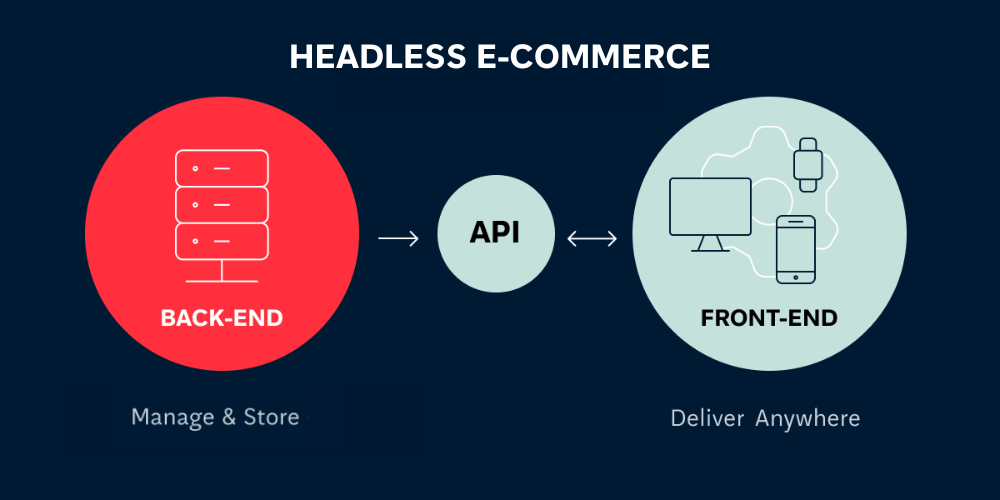How to choose the best e-commerce platform for your business
April 25, 2023 / 7 min read

Photo comes from pexels.com
Picking the right e-commerce platform is crucial for online businesses. This article explains how to choose the best one among various options.
Who should be involved?
Selecting an e-commerce platform seems like a one-man job, but the truth is more people should be involved in the process. Who specifically?
- CEO
As a major business representative, the CEO should have a say in what platform to choose. - CTO
He or she is the main technology representative responsible for the effective execution of the project. If there's no CTO in your company, you'll probably need to hire an external IT expert. - CMO
That's the primary sales and marketing representative responsible for the effective execution from the marketing perspective. - CCO
The last specialist should make sure the platform is usable and intuitive from the customers' perspective.
What should you pay attention to when selecting an e-commerce platform?
Business model and vertical
Here, you should focus on the most important company goals and development strategy for the next three or five years. It's crucial to ensure that the e-commerce platform of your choice is in line with your company's profile and its long-term vision.
Budget
Take all the fixed and variable costs into account. How much will it cost you to buy, use and maintain this platform? Are there better alternatives? Also, make sure you understand how your company will be charged for this platform (e.g., per transaction, per revenue or per used features).
Platform scaling capabilities
E-commerce scalability refers to the ability to execute operations efficiently, no matter how big or small the volumes of traffic are. Here, the type of hosting plays a crucial role – is your platform available on-premises or in the SaaS model?
You want to be sure to pick the platform that won’t limit your growth. Typically, cloud-based solutions are better from the development point of view.
Available features
Here, it all depends on your business needs. For instance, an online grocery store should be interested in product bundles or bulk sales. A store selling contact lenses and eye-care products should look for a platform enabling subscription-based sales. Another example is a fashion store offering diverse product sizes.
Analyse your business profile, see what you need to satisfy customers and pick the solution that ticks all the right boxes.
Integrations and extensibility
It is likely you'll need several integrations with other tools (e.g., CRM or payment gates). How easy would it be to integrate the platform with other tools that you want to use? In 2023, API is a global standard, so you should look for an e-commerce platform that offers such a feature.
Support
At some point, your online store might be down or overloaded. In such a situation, you’ll need effective customer support. Pay attention to two essential questions:
- Support
How quickly the platform provider would help you with your problem. - Uptime
What percentage of time the platform is available, everything above 99,9% is acceptable, it means your store could be down for less than 8:45 hours a year (526 min. exactly).
Security
Do you know what the security risks of e-commerce are? You definitely should! Ask your future provider about the security measures they have in place. Especially ask if the platform is safe to use for your customers.
It should also be PCI-compliant. It’s a set of security standards established by major credit card companies to ensure that businesses that accept credit card payments maintain a secure environment for handling sensitive credit card information.
We don’t need to explain what could be the consequences of running a compromised online store, do we?
SEO-friendliness
While there are dozens of major and minor optimisation options, SEO-friendliness in e-commerce is connected to designing the URL structure of your website, ways of preventing duplicate content, and methods of controlling the indexing behaviour of Google bots. SaaS e-commerce platforms could vary greatly with means of setting up SEO foundations for future organic growth.
Ease of use
Last but not least, you need to find a platform that’s simply easy to use on a daily basis. Believe us, working with a platform you don’t like or understand will shortly become a nightmare, especially given people from many departments will use it (customer service, sales, warehouse, etc.).
If possible, ask for a free trial period so that you can see how the given platform looks and feels before signing the contract.
Available e-commerce platform options
Why cloud-hosted and SaaS e-commerce platforms aren't the same
Put shortly, cloud-hosted open-source e-commerce platforms typically provide a hosting infrastructure that allows users to install and manage their own e-commerce software.
SaaS platforms offer a fully managed, cloud-based e-commerce solution that includes hosting, software, and ongoing support.
In other words, cloud-hosted platforms give users more control over their software, while SaaS platforms offer a simpler, all-in-one solution.
Selecting between these two options is essentially based on finding the answers to the following questions:
- How much can we outsource.
- How much are we willing to pay.
- How much do we trust the platform creators.
- How much do we want to depend on our provider. How much support do we need.
Below, we present a short comparison of both options. Pick the one that suits you best.
On-premises vs. PaaS (platform-as-a-service) vs. SaaS (software-as-a-service)
Again, let’s start with a short explanation:
- On-premises e-commerce platforms are installed and run on your own servers and require you to manage and maintain all the components on your own.
- PaaS e-commerce platforms provide a cloud-based platform that enables businesses to build and customize their own e-commerce solutions without having to worry about managing the infrastructure.
- SaaS e-commerce platforms are fully managed, cloud-based solutions that provide you with everything you need to run an online store. That’s the most hassle-free e-commerce solution.
Ask yourself two vital questions:
- How scalable should the platform be?
- How much control over the infrastructure do we want?
Headless e-commerce vs. traditional (GUI) e-commerce
When it comes to headless e-commerce the front-end user interface is decoupled from the back-end functionality. This allows for more flexibility and customisation options in the front-end presentation layer. It's a good solution for advanced online stores that need full flexibility.
Traditional e-commerce, on the other hand, is a more monolithic approach where the front-end user interface and back-end functionality are tightly integrated. The customiation options are limited, but everything is easier to grasp and manage.
Two questions to consider here are:
- How much control over the website do we want.
- How many channels do we use (website, mobile app, digital assistants, etc.).
Comparison of different e-commerce platforms
Now, let’s have a look at some of the available options. Below, we list platforms that are generally popular and appreciated on the market - BigCommerce, Salesforce Commerce, Shopify, Shopware.
We’re not saying that anything outside this list is bad, but it’s a good place for you to start.

|

|

|

| |
|---|---|---|---|---|
| HOSTING | ||||
| On-premises |
|
|
|
|
| PaaS |
|
|
|
|
| SaaS |
|
|
|
|
| INTEGRATIONS | ||||
| Existing integrations |
Over 1,200 bigcommerce.com/apps |
Over 250 appexchange.salesforce.com |
Over 2,000 apps.shopify.comm |
Over 150 shopware.com/integrations |
| Available payment integrations |
Over 30 (e.g., Amazon Pay, PayPal, PayU, Revolut) bigcommerce.com/payment |
Over 50 (e.g., Adyen, PayPal, Stripe) salesforce.com/appxstore |
Over 50 (e.g., Adyen, Klarna, PayPal, Revolut, Stripe) shopify.com/payment |
Over 30 (e.g., Adyen, Amazon Pay, Klarna, PayPal) shopware.com/#payment |
| PRICING | ||||
| Pricing |
Four plans depending on: storefronts, available features, inventory locations, and online sales value bigcommerce.com/pricing/ |
Three plans depending on: sites, price books, sandboxes salesforce.com/editions-pricing |
Four plans depending on: staff accounts, report features, shipping features, payment fees, available features shopify.com/pricing |
Three plans depending on: available features, support shopware.com/pricing/ |
| Business size | Small, medium, enterprise | Medium, enterprise | Small, medium, enterprise (headless for enterprise only) | Medium, enterprise |
| AVAILABILITY | ||||
| Support |
24/7 support (chat, email, phone) in all plans, API support in the highest plan, active community forum support.bigcommerce.com |
24/7 support (chat, email, phone) in higher plans, active community forum help.salesforce.com |
24/7 support (chat, email, phone) in all plans, active community forum help.shopify.com |
Written 9:00 am - 5:00 pm (UTC-4, CEST) support in the lowest plan, written and phone 7:00 am - 7:00 pm (UTC-4, CEST) support in the middle plan, 24/7 support (email, phone) in the highest plan, moderately active community forum No public help website |
| Uptime | Claimed 99.99% uptime, not in public SLA | Claimed 99.9% uptime, not in public SLA | Claimed 99.99% uptime, not in public SLA | Claimed 99.99% uptime, 99% uptime in public SLA |
| EXTENDABILITY | ||||
| APIs | REST, GraphQL | REST | REST, GraphQL | REST |
| OTHER | ||||
| SEO Friendliness |
Wide possibilities of SEO optimization:
|
Advanced options:
|
Basic SEO options are easily accesible, including creating titles, metatags or image descriptions. Limitations:
|
Average posibilities of SEO optimization:
|
| Headless |
|
|
|
|
| Scalability | Out-of-the-box for the client - it's a SaaS | Out-of-the-box for the client - it's a SaaS | Out-of-the-box for the client - it's a SaaS | Out-of-the-box for the client, if it's a SaaS version |
| SUMMARY | ||||
| Things we like |
A lot of existing integrations Price No transaction fees 24/7 support Great community support Extendable thanks to API-first approach GraphQL API out-of-the-box |
Part of a bigger ecosystem Great community support Extendable thanks to API-first approach |
A lot of existing integrations Price (excluding Shopify Plus) No transaction fees (if using Shopify Payments) 24/7 support Great community support Extendable thanks to API-first approach GraphQL API out-of-the-box |
Fully open source Freedom in selecting hosting solution Uptime in public SLA Extendable thanks to API-first approach |
| Things we don't like | No uptime in public SLA |
Part of a bigger ecosystem Undisclosed pricing 24/7 support in higher plans only No uptime in public SLA |
Price (Shopify Plus) Transaction fees (if not using Shopify Payments) No uptime in public SLA |
Not so many existing integrations Price and undisclosed pricing Transaction fees 24/7 support in higher plans only Moderate community support |
| Online stores examples |
Ted Baker
Ollie King Arthur Baking Company |
Pet Smart
lululemon |
Allbirds
Knix Brooklinen | Grohe |
| Website | bigcommerce.com | salesforce.com | shopify.com | shopware.com |
Wrapping up
We hope this article helped you understand the intricacies of selecting the best e-commerce platform for your store.
If you’re still having some doubts (after all, selecting an e-commerce platform is a big decision) we are here to help! E-commerce is one of our major areas of expertise, and NoA Ignite can operate as your external CTO.
Author

Grzegorz Cichosz
Technology Advisor
9 years in IT, 8 with web technologies, and 3 with cloud platforms and serverless computing. Grzegorz’s career as a software architect, full-stack developer, and engineer has been built around simplifying code, solutions, infrastructure, and requirements for everyone. As a Fresh Event Storming enthusiast and efficiency evangelist, he’s a potent part of any team he’s on.
Related articles
![A well-crafted prompt doesn’t just work once. It works across teams, channels, and campaigns. It can be tweaked for new use cases and refined based on what performs best.]()
June 27, 2025 / 4 min read
Prompts are marketing assets: how to reuse, and scale them
Prompts aren’t throwaway lines. They’re repeatable, scalable assets that can streamline your marketing your team’s output. Learn how to build a prompt library that delivers.
![Woman using a wheelchair in the office settings]()
June 17, 2025 / 5 min read
What is accessibility and why it matters?
Accessibility ensures everyone — including those with disabilities or limitations — can read, navigate, and engage with your content equally.





